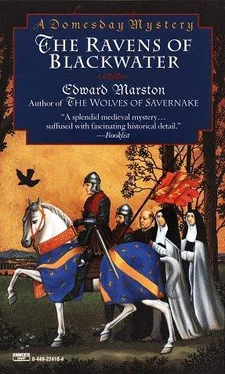Edward Marston - Ravens Of Blackwater
Здесь есть возможность читать онлайн «Edward Marston - Ravens Of Blackwater» весь текст электронной книги совершенно бесплатно (целиком полную версию без сокращений). В некоторых случаях можно слушать аудио, скачать через торрент в формате fb2 и присутствует краткое содержание. Год выпуска: 0101, Жанр: Исторический детектив, на английском языке. Описание произведения, (предисловие) а так же отзывы посетителей доступны на портале библиотеки ЛибКат.
- Название:Ravens Of Blackwater
- Автор:
- Жанр:
- Год:0101
- ISBN:нет данных
- Рейтинг книги:4 / 5. Голосов: 1
-
Избранное:Добавить в избранное
- Отзывы:
-
Ваша оценка:
- 80
- 1
- 2
- 3
- 4
- 5
Ravens Of Blackwater: краткое содержание, описание и аннотация
Предлагаем к чтению аннотацию, описание, краткое содержание или предисловие (зависит от того, что написал сам автор книги «Ravens Of Blackwater»). Если вы не нашли необходимую информацию о книге — напишите в комментариях, мы постараемся отыскать её.
Ravens Of Blackwater — читать онлайн бесплатно полную книгу (весь текст) целиком
Ниже представлен текст книги, разбитый по страницам. Система сохранения места последней прочитанной страницы, позволяет с удобством читать онлайн бесплатно книгу «Ravens Of Blackwater», без необходимости каждый раз заново искать на чём Вы остановились. Поставьте закладку, и сможете в любой момент перейти на страницу, на которой закончили чтение.
Интервал:
Закладка:
“You were mentioned in prayers,” he said. “Prioress Mindred and her sisters were intensely grateful for the protection you gave them on their journey. God’s blessing was called down upon you.”
Ralph grinned. “I can think of other ways in which the nuns could have shown their thanks but they may not fall within the rules of the Benedictine Order.”
“I am certain of it,” said Gervase crisply, then turned to the priest. “You visited the priory?”
“I do so on a regular basis to take Mass.” “Then you know its inner workings.”
“I know only what they wish me to know,” replied Oslac. “And that is as it should be. A convent of holy sisters is a community that looks inward and needs no interference from outside. They accept me at the priory but they administer it entirely by themselves.”
“Prioress Mindred seems a capable woman,” said Gervase. “Extremely capable.”
“I was more impressed by Sister Tecla,” opined Ralph. “Even in her nun’s attire, she struck me as a most attractive young woman and her voice was bewitching. What makes such a lovely creature as that turn her back on the world?”
“The call from God.”
“I wish she had heard my call first.”
“You must forgive Ralph,” said Gervase quickly. “He is unaccustomed to the meaning of a spiritual life.”
His colleague beamed. “Sister Tecla must instruct me.”
“She has other preoccupations,” said Oslac with a smile that showed he had taken no offence. “All ecclesiastical institutions have a special function to perform and the priory is no exception. It fulfills its purpose in the most striking way and I have nothing but praise for the holy sisters. They are all quite remarkable servants of God.”
“Does that include Sister Gunnhild?” asked Gervase. “Sister Gunnhild?”
“I met her when I arrived,” he said. “The lady was less than friendly
to me. Since I helped to escort her prioress and one of the sisters all the way back to Maldon, Sister Gunnhild might at least have shown a token of gratitude.”
“She thanked you in her prayers,” assured Oslac. “That was not the impression I received.”
“Do not worry about it, Gervase,” said Ralph jovially. “You cannot
expect your boyish appeal to win the heart of every woman. Sister Tecla fell in love with you-what more do you want? Forget this Sister Gunnhild.”
“I simply wished to know more about her,” said Gervase, unhappy at the teasing reference to Tecla. “The lady puzzled me, that is all. Her manner was peculiar.” He turned to the priest. “Can you tell us anything about her?”
“Gunnhild is a true Christian,” said Oslac.
“Of Danish stock, by the name.”
“Indeed, she is, though born and brought up in Maldon.” “What did I do that upset her so much?”
“You share a grievous fault with me, I fear.”
“With you, Father Oslac?”
The priest chuckled. “We are both men.”
“Does she hate the sex so violently?” asked Ralph.
“No,” said Oslac, “she just considers us irrelevant. A convent is by definition an exclusively female community and Sister Gunnhild sets great store by that.” He put a hand on his chest. “In my case, I have to confess, she has a further cause for disapproval.”
“What is that?” said Gervase.
“I am married.”
Ralph Delchard laughed in surprise and warmed even more to the man. He despised the whole notion of celibacy and was delighted to find that the Church of All Souls’ was served by a flesh-and-blood priest with the promptings common to normal human beings. Vows of chastity left a person with the bloodless pallor of a Brother Simon or the porcine sheen of a Canon Hubert Oslac the Priest, by contrast, had a ruddy complexion and a twinkle in his eye, both of which Ralph ascribed to the presence of a woman in his bed at nights. Gervase Bret took even more interest in the news because it mirrored his own intent. It was love of Alys that had made him abandon his novitiate at Eltham Abbey and it was the prospect of marriage to her that gave his life such joy and direction. Gervase was touched by Oslac’s readiness to confide in them.
“You are a bold man,” he said. “Archbishop Lanfranc has attacked
clerical marriage.”
“Archbishop Lanfranc is a monk.”
“He frowns upon relations with the fairer sex.”
“The Archbishop of Canterbury is a great man who serves a great king,” said Oslac, “and he has made substantial improvements to the Church since he was appointed. I am more than willing to accept his rulings on almost everything else but I will not divorce my wife because of his frown. My own father was a married priest and I inherited this benefice from him. I am hopeful that my son will take over here from me in due course.”
“Your son?” said Ralph. “You have children?” “Four.”
“No wonder Sister Gunnhild dislikes you!” said Gervase.
They shared a communal laugh. It was time to leave Maldon and ride back to Champeney Hall but the two commissioners were glad that they had taken the trouble to meet Oslac the Priest. His help was invaluable. Their host had showered them with information about the town and its personalities while Gilbert Champeney dealt only in gossip and anecdote. Oslac’s comments were at once more interesting and reliable. He lived at the very heart of the community in every sense and was thus more intimately acquainted with its nuances of behaviour. They liked him and resolved to call on him again before they finally departed from Maldon.
Ralph had been toying with the idea of asking about the origin of Humphrey’s nickname but the nature of Guy FitzCorbucion’s mutilation had somehow deprived him of that urge. A question that would in any case be improper to a priest had now become severely distaste-ful as well so Ralph mastered his curiosity. Instead, it was Gervase who sought elucidation.
“Do you know a man called Tovild?” he asked.
“I know three or four by that name,” replied Oslac. “This one is unusual.”
“Then you are asking about Tovild the Haunted.” Gervase was pleased. “You know him?”
“Of course. We all know Tovild the Haunted.” “Who is he?”
“As harmless an old man as you could wish to meet.”
“But where did he get his name?” asked Ralph. “Put Gervase out of his misery, I beg you, or I will have no respite from his ceaseless prattle about this Tovild the Haunted. Who is this fellow?”
“And what is it that haunts him?” said Gervase. Oslac gazed in the direction of Northey Island. “The Battle of Maldon.”
Dusk encouraged him to move more freely about the island. Wistan had now got through the best part of a second day without detection and it bred even more confidence in him. He was learning to think like a fugitive and to see the folly of trusting in a single hiding place. He needed a variety of cover so that he could shift easily from one burrow to another, then on again to a third or fourth, when they finally came for him. Therefore, Wistan chose a series of locations where thick undergrowth or favourable contours could be used for concealment, and he practised scurrying between them at full pelt. The playful exercise cheered him. Time passed and drained even more colour out of the cloudless sky.
Two problems vexed him. The first was the possible use of animals to track him down. Like all Norman barons, Hamo FitzCorbucion was immensely fond of hunting and he kept a pack of hounds to help him pursue deer and wild boar. Those dogs could just as easily be turned on a human quarry and Wistan could never kill fifty baying dogs with a knife and a desire for revenge. A tree would give him a degree of safety if he climbed high enough, but the hounds might sniff him out and he would be trapped. His only salvation lay in the River Blackwater and it was to the muddy coastline that he now turned his interest. Water did not bear scent. Hiding places in the shallows or among the reeds would even defeat the delicate nostrils of hunting dogs.
Читать дальшеИнтервал:
Закладка:
Похожие книги на «Ravens Of Blackwater»
Представляем Вашему вниманию похожие книги на «Ravens Of Blackwater» списком для выбора. Мы отобрали схожую по названию и смыслу литературу в надежде предоставить читателям больше вариантов отыскать новые, интересные, ещё непрочитанные произведения.
Обсуждение, отзывы о книге «Ravens Of Blackwater» и просто собственные мнения читателей. Оставьте ваши комментарии, напишите, что Вы думаете о произведении, его смысле или главных героях. Укажите что конкретно понравилось, а что нет, и почему Вы так считаете.












